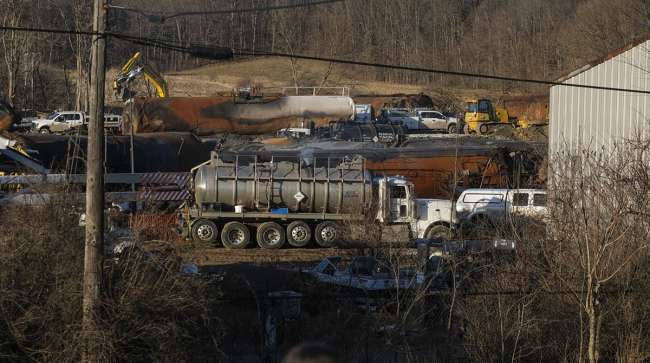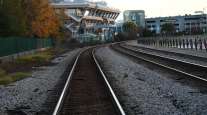Senior Reporter
NTSB to Investigate Safety at Norfolk Southern

[Stay on top of transportation news: Get TTNews in your inbox.]
In the wake of three high-profile freight train accidents within the last month, including one that caused environmental damage in East Palestine, Ohio, and another that killed the conductor, the National Transportation Safety Board announced March 7 it is opening a special investigation into the safety practices of Norfolk Southern Corp.
A fourth derailment occurred the morning of March 9 in Calhoun County, Ala., with no reports of injuries or hazardous leaks.
Shortly after the NTSB announcement, the Department of Transportation’s Federal Railroad Administration (FRA) said it will conduct its own 60-day assessment of Norfolk Southern’s railway safety operations “following multiple safety incidents.”
The FRA said in a statement it will take a broad look at the railroad’s operations, including reviewing findings from a previous safety audit and providing regulatory oversight.
“We are initiating this further supplemental safety review of Norfolk Southern, while also calling on Norfolk Southern to act urgently to improve its focus on safety so the company can begin earning back the trust of the public and its employees,” Transportation Secretary Pete Buttigieg said in a statement.
NTSB to open a special investigation into Norfolk Southern Railway’s safety practices and culture: https://t.co/9xwaEtF1w3 — NTSB Newsroom (@NTSB_Newsroom) March 7, 2023
While Norfolk Southern has previously said it places a high value on safety, the NTSB urged Norfolk Southern to look inward and begin corrective actions.
“Given the number and significance of recent Norfolk Southern accidents, the NTSB also urges the company to take immediate action today to review and assess its safety practices, with the input of employees and others, and implement necessary changes to improve safety,” the agency said in a statement. “The continued safe operations of Norfolk Southern is vital to the United States. The NTSB is concerned that several organizational factors may be involved in the accidents, including safety culture. The NTSB will conduct an in-depth investigation into the safety practices and culture of the company. At the same time, the company should not wait to improve safety and the NTSB urges it to do so immediately.”
While not unprecedented, NTSB special investigations are rare. The last time the NTSB opened this type of probe was almost a decade ago when it looked into Metro-North Railroad, the commuter rail system that links New York City with its northern suburbs.

Homendy
The Feb. 3 derailment in East Palestine sent toxic chemicals into the soil, nearby creeks and air, and several train cars containing hazardous materials burned for several days. NTSB Chair Jennifer Homendy said the derailment was “100% preventable” and it was “no accident.”
Residents of the east Ohio town 53 miles from Pittsburgh have complained about respiratory illnesses, burning eyes and feeling sick as a result of being exposed to the chemicals.
On March 6, the railroad said 2,366 tons of waste soil have been removed for EPA-certified processing, and 3.2 million gallons of water have been collected from the site, including rainwater as it falls.
In response to the derailment, Norfolk Southern said March 5 it is increasing the use of detectors placed along railroad tracks to spot overheating bearings and other problems.
Pennsylvania Gov. Josh Shapiro said the railroad has agreed to spend several million dollars to cover the cost of the clean-up and recovery in his state near the Ohio-Pennsylvania border.
Just one month after that accident, on March 4, another Norfolk Southern train derailed near Springfield, Ohio.
The Railroad Safety Advisory Committee will meet on 3/27/2023 focusing on the events related to last month’s incident in East Palestine, OH. RSAC provides advice and recommendations on railroad safety matters through a consensus process. Learn more here: https://t.co/cnD4i1Hf9y — The FRA (@USDOTFRA) March 7, 2023
The railroad told authorities that this incident did not involve hazardous materials. But officials acknowledged days later that cars on the train that did not derail did have hazardous contents.
The railroad had another accident March 6 in Cleveland that left a railroad conductor dead when he was struck by a dump truck as his train moved through a rail crossing at the Cleveland-Cliffs Inc. Cleveland Works facility.

Shaw
Speaking after that accident the railroad’s president and CEO Alan Shaw said he wants to rebuild the railroad’s safety culture.
“I called together every member of our management team this afternoon to emphasize the urgency of finding new solutions. Tomorrow (March 8) we will hold safety stand-down briefings reaching every employee across our network,” Shaw said in a statement. “Moving forward, we are going to rebuild our safety culture from the ground up. We are going to invest more in safety. This is not who we are, it is not acceptable, and it will not continue.”
The NTSB has sent a team of investigators to Cleveland to find the cause of the latest accident.
We will create a new regional training center in Ohio for first responders and expand our Operation Awareness & Response (OAR) program, which travels our 22-state network and trains first responders on how to respond safely to rail incidents. https://t.co/w1Q3M6RZWr pic.twitter.com/n4cbxY98yI — Norfolk Southern (@nscorp) March 8, 2023
The conductor who died was Louis Shuster, 46, of Cleveland. In addition to his work at Norfolk Southern he was president of the Brotherhood of Locomotive Engineers and Trainmen Division 607.
“Lou was a passionate and dedicated union brother,” BLET Division 607 Local Chairman Pat Redmond said in a statement. “He was always there for his coworkers. He was very active in helping veterans who worked on the railroad and veterans all across our community.”
The union said it will be a party to the NTSB investigation and will assist in any way it can.
Want more news? Listen to today's daily briefing below or go here for more info:




